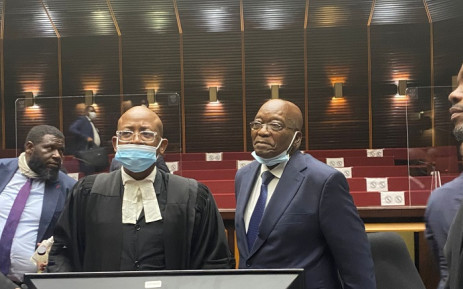ZUMA’S FREEDOM IN THE BALANCE AS SCA WEIGHS ARGUMENTS IN MEDICAL PAROLE APPEAL

ZUMA’S FREEDOM IN THE BALANCE AS SCA WEIGHS ARGUMENTS IN MEDICAL PAROLE APPEAL
Zuma and the Department of Correctional Services are appealing an earlier Gauteng High Court ruling that set aside the decision by former Correctional Services commissioner, Arthur Fraser, to grant the former president medical parole.

CAPE TOWN – A full bench of Supreme Court of Appeal (SCA) judges is what stands between relative freedom or going back to jail for former President Jacob Zuma.
Zuma and the Department of Correctional Services are appealing an earlier Gauteng High Court ruling that set aside the decision by former Correctional Services commissioner, Arthur Fraser, to grant the former president medical parole.
Zuma’s legal defence spent most of Monday arguing that his release on medical grounds was above board and that Fraser had exercised his discretion.
Advocate Dali Mpofu, for Zuma, and lawyers representing the Department of Correctional Services made submissions before a full bench of Supreme Court of Appeal judges on Monday, defending Fraser’s decision.
Mpofu is also adamant that Zuma is suffering from a terminal illness which carries a “significant risk to his life”.
While Zuma’s medical records are redacted and classified, Mpofu did refer to a “lesion” on the colon which had been noted in one of the medical reports supporting his release.
He argued that disregarding the months that Zuma spent at home on medical parole should his appeal fail would be like a “double sentence”.
Zuma’s 15-month sentence comes to an end on 7 October.
Mpofu told the SCA that Fraser was not a “sangoma” and there was no way he could have predicted that his decision to grant parole for Zuma would be taken on review.
He said that public officials with discretionary administrative power like Fraser have a certain status.
“It doesn’t necessarily mean they must be experts,” argued Mpofu.
Mpofu submitted that Zuma was 80-years-old and “undeniably a frail person” and showed no “propensity and ability to re-offend”.
Zuma and Fraser’s submissions were not made without any questions from the bench.
Justice Nambitha Dambuza, who presided over the appeal, had some probing questions for Advocate Sy Mphahlale, representing Fraser and Correctional Services.
She asked why members of Parliament would make lengthy efforts to establish a statutory body like the medical parole advisory board, only to disregard its decisions.
The appeals board found that there were no grounds to release Zuma on medical parole.
“Why would the legislature go to all that trouble of putting together a body of 10 or 11 medical practitioners who would decide by way of majority what the condition of the applicant is, if their condition would be considered similarly as the applicant’s doctor?” asked Dambuza.
The Helen Suzman Foundation, which had challenged Fraser’s decision, told the SCA that he had power to grant Zuma medical parole without all the information and a finding and he acted unlawfully.
Following submissions from Zuma, Fraser, the Democratic Alliance, AfriForum and the Helen Suzman Foundation, Zuma’s freedom will now be decided by a full bench of judges, with just two months left of his sentence.





